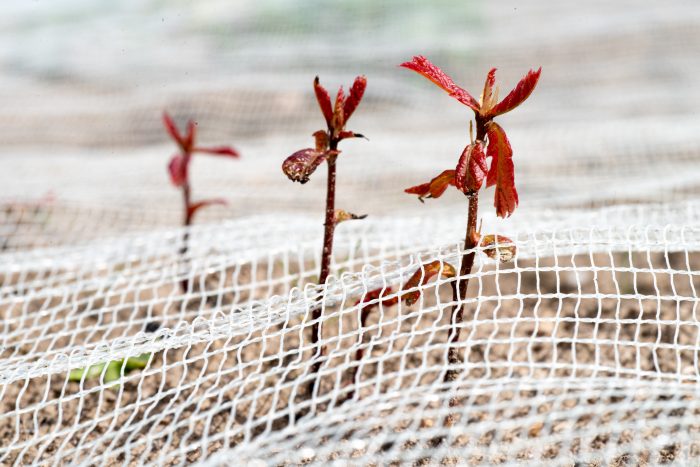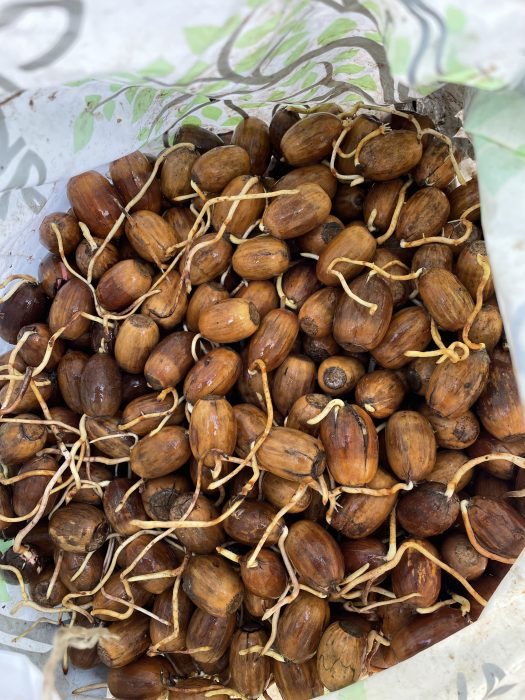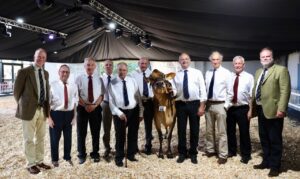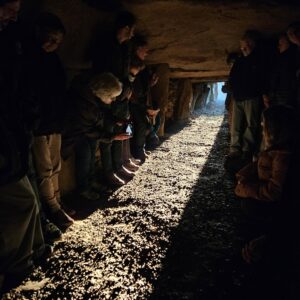A solution to deliver the UK promise, by Robin Waymouth

In order to work towards Carbon Neutrality and slow global warming, the UK pledged, in 2019, to plant 60 million broadleaf saplings annually for 30 years. However, due to adverse weather conditions in 2022, there was a loss of 50% of planted young saplings, while the lack of successful Government funding and grant schemes led to a shortage of all the important sapling species in the supply chain.
Ag Nuage (Jersey) was registered with the Jersey Finance Commission in November 2021. I see it as a movement for the future of farming in Jersey, as a replacement for all the crops that are now non-viable and as a rotation crop.
It aims to reduce the shortfall in sapling supply of English Oak (Quercus robur) and other fine woodland species such as Sweet Chestnut, Horse Chestnut and Beech, to the UK by contracting Jersey’s associated growers as a nursery tree producer and gifting the young broadleaf saplings to the National Parks and Estates, The Tree Foundation, The Woodland Trust and the local County Councils.
Jersey’s unique geographical position and topography make it the perfect location for the successful growth of healthy saplings over a four-year period until delivery to the mainland. With an existing network, infrastructure, expertise, teams and equipment, Jersey is poised to take action as soon as funding is secured for the planting of millions of saplings in 2023, and then each consecutive year, for first delivery from 2027.
The problem
In the 2019 Conservative Party Manifesto and the wish of The Crown in the creation of The Green Canopy of the Commonwealth, the UK set in motion the endeavour of increasing its tree population by planting 60 million broadleaf saplings annually, for the next 30 years. This endeavour aimed to slow Global Warming and in part achieve Carbon Neutrality by 2050 on the part of the UK.
At that time, with the UK’s imminent departure from the EU, the situation within the marketplace was already evident with the importation of £190 million of Dutch, Italian and French nursery stocks. Import licences, BREXIT complications and a ban on the import of certain young tree stocks due to disease added to the difficulties in acquiring adequate saplings to meet the Government’s tree planting goals.
Each year, in the United Nations Climate Change Conference (COP), Governments and Carbon-burning industries cooperate to reach agreements and promises to support the environment. In November 2022 (COP27), it was stated that 70 billion trees needed to be planted on planet Earth without delay.
While the UK Government’s tree planting goals in 2019 were achievable, they failed to take into account the many factors that are involved in procuring adequate saplings on an annual basis. Extreme weather events are occurring globally on a far greater scale than ever before and with the drought of summer 2022, the UK lost 50% of saplings planted out too young. In addition, a lack of government funding and grant schemes for UK growers added further problems in supplying adequate numbers of saplings to achieve annual tree planting goals.
A shortage of the all-important English Oak (Quercus robur) and other fine woodland species has led to a near total failure of the endeavour. Terese Coffey (10 December 2022), suggested that ‘the endeavour and promises made were just not achievable’.
The solution
The Dutch company Shell has already created a successful business model that we believe can be replicated with the Ag Nuage (Jersey) project in Jersey. Shell’s CEO, Ben Van Bergen, contracted Dutch growers in the production of millions of saplings, gifting to 60 countries with the compliments of Shell as part of their carbon offset strategy.
A smaller example of this business model in practice can be seen in the UK, where Woodland Trust director, John Tucker, contracted Lincolnshire Growers in the production of hedgerow saplings using donated funds from Government Grant Schemes. These hedgerow saplings were later supplied to the National Farmers Union (NFU) to in turn be gifted to farmers who applied for stocks. While the
practice of growing hedgerow stocks differs on a horticultural basis from tree saplings, the success of both business models highlights the growing need to implement these strategies and to deliver saplings to fulfil the government’s pledge to plant 60 million trees annually for 30 years, so as to slow global warming and achieve, in part, carbon neutrality by 2050.
With the financial support of a UK industry giant, Jersey would become a nursery for the UK, providing millions of English Oak saplings each year to be gifted to the National Parks & Estates, The Tree Foundation, The Woodland Trust and the local County Councils. This would support the UK with the sheer numbers of native broadleaf saplings required on an annual basis to be able to fulfil their endeavour and make a significant change in the environment and the future of planet Earth.
The industry that chooses to support the project would be one that recognises their obligation to support the UK’s future and the environment, gifting British grown saplings to the nation and offsetting their carbon footprint in the process.
This is a solution that makes a tangible difference: cutting out the middle man and securing millions of native broadleaf saplings direct from source within the British Isles at cost price to gift back to the UK.
Why Jersey?
Jersey’s unique location at 2 degrees further south than mainland UK makes a substantial difference to the growing environment for certain plants and trees. The Island’s weather patterns mean that it has, on average, more sunshine than the UK and a milder winter with less frost and very rare snowfall. In addition, there are no deer or grey squirrels in Jersey, which account for much sapling damage in the UK.
The Associated Growers of Jersey are those farmers ready and willing to grow a crop of trees as soon as contracts have been negotiated with UK buyers. They have modern farming practices, infrastructure and the efficiency of mass production, as demonstrated by the production of Jersey Royal potatoes, and they are supported by the Government of Jersey, Howard Davis Farm and by an Experimental & Science Laboratory Station (DEFRA Associated). Together, Jersey’s growers successfully run multi-million-pound operations for both the local, national and international markets.
Respected Horticulturist, David Howard, confirmed that Jersey’s topography, climate and the wealth of knowledge and expertise in the subject of horticulture means that Jersey Associated Growers could make a tangible difference to the endeavour of supporting the UK with a substantial supply of native broadleaf saplings.
The science of crop rotation is important in this endeavour as the planting of woodland tree species allows fields affected by pests that affect the important Jersey Royal potato production to recover for up 3-4 years, thus producing healthier potato crops in the future. Jersey has the rotation land available to grow millions of saplings on a continuous, rolling year basis as well as the infrastructure, manpower and expertise to deliver on our promise.
Success to date
2022 was a ‘mast year’ for the English Oak; a natural phenomenon where some tree species produce very large crops of seeds, compared to very few in others.
I am the founder of Ag Nuage (Jersey), with a lifelong background in horticulture; I was once the largest exporter of cut flowers in Jersey for the UK market. I became aware of this mast year phenomenon and set about creating an Island-wide mission to collect as many acorns as possible.
As part of their social impact programme, school children in Jersey, along with members of the public, collected 188,000 acorns for the project which were sown into Jersey’s fields on 23 February 2023.
One 4-year-old announced: ‘We are planting these because they breathe in carbon dioxide and breathe out oxygen!’
The project gathered a lot of momentum and was supported by the local media and the Jersey horticultural industry. The collected acorns were planted in protected areas of propagation and cultivated fields, as a rotation crop alongside Jersey’s last remaining export crop, the famous Jersey Royal new potato.
I am concerned with the present situation of our farming landscape. If Jersey were known for Nursery Oak tree production, in PR terms this would be more respectful than some other new export crops being promoted.
Funding
Ag Nuage (Jersey), on behalf of Jersey’s Associated Growers, would like to collaborate with a UK industry giant to gain funding for the growth of millions of saplings in Jersey to be gifted to the UK.
Jersey’s Associated Growers are poised and ready to raise and grow English Oak (Quercus robur) saplings in early 2023 for delivery in 2027 and from then on as a continuous annual sowing and delivery.
We are seeking financial support for the project to grow millions of saplings annually to be gifted to the UK to support the delivery of their promise to plant
60 million trees annually for 30 years.
For further sponsorship details of this scheme please contact Robin Waymouth: rawaymouth@icloud.com





